- Home
- Natalia Ginzburg
The Little Virtues Page 6
The Little Virtues Read online
Page 6
Writing poetry was easy. I was very pleased with my poems, to me they seemed almost perfect. I could not see what difference there was between them and real, published poems by real poets. I could not see why when I gave them to my brothers to read they laughed and said I would have done better to study Greek. I thought that perhaps my brothers didn’t know much about poetry. Meanwhile I had to go to school and study Greek, Latin, mathematics, history—and I suffered a good deal and felt I was in exile. I spent my days in writing poems and copying them out in exercise books; I did not study for my lessons so I used to set the alarm for five in the morning. The alarm went off but I went on sleeping. I woke at seven, when there was no longer any time to study and I had to dress to go to school. I was not happy, I was always extremely afraid and filled with feelings of guilt and confusion. When I got to school I studied history during the Latin lesson, Greek during the history lesson, and so on, and I learnt nothing. For quite a while I thought it was all worth it because my poems were so beautiful, but at a certain moment I began to think that perhaps they were not so beautiful and it became tedious for me to write them and take the trouble to find subjects; it seemed to me that I had already dealt with every possible subject, and used all the possible words and rhymes—speranza, lontananza; pensiero, mistero; vento, argento; fragranza, speranza (hope, distance; thought, mystery; wind, silver; fragrance, hope). I couldn’t find anything else to say. Then a very nasty period began for me, and I spent the afternoons playing about with words that no longer gave me any pleasure while at the same time I felt guilty and ashamed about school. It never entered my head that I had mistaken my vocation—I wanted to write as much as ever, it was just that I could not understand why my days had suddenly become so barren and empty of words.
The first serious piece I wrote was a story. A short story of five or six pages; it came from me like a miracle in a single evening, and when afterwards I went to bed I was tired, bewildered, worn out. I had the feeling that it was a serious piece, the first that I had ever written: the poems and the novels about girls and carriages suddenly seemed very far away from me, they were the naïve and ridiculous creatures of another age and they belonged to a time that had disappeared for good. There were characters in this new story. Isabella and the man with the reddish beard were not characters; I didn’t know anything about them beyond the words and phrases with which I described them—they appeared as if at random and not by my design. I had chosen the words and phrases I used for them by chance; it was as if I had a sack and had indiscriminately pulled out of it now a beard and now a cook who was a negress or some other usable item. But this time it was not a game. This time I had invented characters with names that I could not possibly have changed; I could not have changed any part of them and I knew a great deal about them—I knew how their lives had been up to the day of my story even though I did not talk about this in the story as it was not necessary. And I knew all about the house, the bridge, the moon and the river. I was seventeen and I had failed in Latin, Greek and mathematics. I had cried a lot when I found out. But now that I had written the story I felt a little less ashamed. It was summer, a summer night. A window that gave on to the garden was open and dark moths fluttered about the lamp. I had written my story on squared paper and I had felt happy as never before in my life; I felt I had a wealth of thoughts and words within me. The man was called Maurizio, the woman was called Anna and the child was called Villi, and the bridge, the moon and the river were also there. These things existed in me. And the man and the woman were neither good nor evil, but funny and a little sad and it seemed to me that I had discovered how people in books should be—funny and at the same time sad. Whichever way I looked at this story it seemed beautiful to me: there were no mistakes in it; everything happened as it should, at the right time. At that moment it seemed to me that I could write millions of stories.
And in fact I wrote quite a few, at intervals of a month or two—some were quite good and some not so good. Now I discovered that it is tiring to write something seriously. It is a bad sign if it doesn’t make you tired. You cannot hope to write something serious frivolously flitting hither and thither, as it were with one hand tied behind your back. You cannot get off so lightly. When someone writes something seriously he is lost in it, he is sucked down into it up to his eyebrows; and if there is a very strong emotion that is preoccupying him, if he is very happy or very unhappy for some let us say mundane reason which has nothing to do with the piece he is writing, then if what he is writing is real and deserves to live all those other feelings will become dormant in him. He cannot hope to keep his dear happiness or dear unhappiness whole and fresh before him; everything goes off into the distance and vanishes and he is left alone with his page; no happiness or unhappiness that is not strictly relevant to that page can exist in him, he cannot possess or belong to anything else—and if it does not happen like this, well that is a sign that the page is worthless.
And so for a certain period—which lasted about six years—I wrote short stories. Since I had discovered that characters existed it seemed to me that to have a character was enough to make a story. So I was always hunting for characters, I looked at the people in the tram and on the street and when I found a face that seemed suitable for a story I wove some moral details and a little anecdote around it. I also went hunting for details of dress and people’s appearance, and how their houses looked inside; if I went into a new room I tried to describe it silently to myself, and I tried to find some small detail which would fit well in a story. I kept a notebook in which I wrote down some of the details I had discovered, or little similes, or episodes which I promised myself l would use in stories. For example I would write in my notebook ‘She came out of the bathroom trailing the cord of her dressing-gown behind her like a long tail’, ‘How the lavatory stinks in this house—the child said to him—When I go, I hold my breath—he added sadly’, ‘His curls like bunches of grapes’, ‘Red and black blankets on an unmade bed’, ‘A pale face like a peeled potato’. But I discovered how difficult it was to use these phrases when I was writing a story. The notebook became a kind of museum of phrases that were crystallized and embalmed and very difficult to use. I tried endlessly to slip the red and black blankets or the curls like bunches of grapes into a story but I never managed to. So the notebook was no help to me. I realized that in this vocation there is no such thing as ‘savings’. If someone thinks ‘that’s a fine detail and I don’t want to waste it in the story I’m writing at the moment, I’ve plenty of good material here, I’ll keep it in reserve for another story I’m going to write’, that detail will crystallize inside him and he won’t be able to use it. When someone writes a story he should throw the best of everything into it, the best of whatever he possesses and has seen, all the best things that he has accumulated throughout his life. If you carry details around inside yourself for a long time without making use of them, they wear out and waste away. Not only details but everything, all your ideas and clever notions. At the time when I was writing short stories made up of characters I had chanced on, and minute descriptive details, at that time I once saw a hand-cart being pushed through the street and on it was a huge mirror in a gilded frame. The greenish evening sky was reflected in it and as I stopped to watch while it went past I was feeling extremely happy, and I had the impression that something important had happened. I had been feeling very happy even before I saw the mirror, and it suddenly seemed to me that in the greenish resplendent mirror with its gilded frame the image of my own happiness was passing by me. For a long time I thought that I would put this in a story, for a long time simply remembering that hand-cart with the mirror on top of it made me want to write. But I was never able to include it anywhere and finally I realised that the image had died in me. Nevertheless it was very important. Because at the time when I was writing my short stories I always concentrated on grey, squalid people and things, I sought out a contemptible kind of reality lacking in glory. There was a certain malign
ancy in the taste I had at that time for finding minute details, an avid, mean desire for little things—little as fleas are little; I was engaged on an obstinate, scandal-mongering hunt for fleas. The mirror on the hand-cart seemed to offer me new possibilities, perhaps the ability to look at a more glorious and splendid kind of reality which did not require minute descriptions and cleverly noticed details but which could be conveyed in one resplendent, felicitous image.
In the last analysis I despised the characters in the short stories I was writing at that time. Since I had discovered that it works well if a character is sad and comic I made characters who, because of their comic and pitiable qualities, were so contemptible and lacking in glory that I myself could not love them. My characters always had some nervous tic or obsession or physical deformity, or some rather ridiculous bad habit—they had a broken arm in a black sling, or they had sties in their eyes, or they stuttered, or they scratched their buttocks as they talked, or they limped a little. I always had to characterize them in some such way. For me this was a method of running away from my fear that they would turn out too vague, a way of capturing their humanity (which, subconsciously, I did not believe in). Because at that time I did not realize—though when I saw the mirror on the hand-cart I began, confusedly, to realize it—that I was no longer dealing with characters but with puppets, quite well painted and resembling men, but puppets. When I invented them I immediately characterized them, I marked them with some grotesque detail, and there was something nasty in this; I had a kind of malign resentment against reality. It was not a resentment based on anything real, because at that time I was a happy girl, but it appeared as a kind of reaction against naïvety; it was that special resentment with which a naïve person who always thinks she is being made a fool of defends herself—the resentment of a peasant who finds himself in a city for a while and sees thieves everywhere. At first I was bold, because this seemed to me to be a great ironic triumph over the naïvely pathetic effusions which were all too apparent in my poems. Irony and nastiness seemed to be very important weapons in my hands; I thought they would help me write like a man, because at that time I wanted terribly to write like a man and I had a horror of anyone realizing from what I wrote that I was a woman. I almost always invented male characters because they would be the furthest and most separate from myself.
I became reasonably good at blocking out a story, at getting rid of superfluous material and introducing details and conversations at the appropriate moments. wrote dry, clear stories that contained no blunders or mistakes of tone and that came to a convincing conclusion. But after a while I had had enough of this. The faces of people in the street no longer said anything interesting to me. Someone had a sty and someone had his cap on back to front and someone was wearing a scarf instead of a shirt, but these things no longer mattered to me. I was fed up with looking at things and people and describing them to myself. The world became silent for me. I could no longer find words to describe it, I no longer had any words capable of giving me pleasure. I didn’t have anything anymore. I tried to remember the mirror, but even that had died in me. I carried a burden of embalmed objects around inside of me—silent faces and ashen words, places and voices and gestures that were a dead weight on my heart, that had no flicker of life in them. And then my children were born and when they were very little I could not understand how anyone could sit herself down to write if she had children. I did not see how I could separate myself from them in order to follow someone or other’s fortunes in a story. I began to feel contempt for my vocation. Now and again I longed for it desperately and felt that I was in exile, but I tried to despise it and make fun of it and occupy myself solely with the children. I believed I had to do this. I spent my time on creamed rice and creamed barley and wondering whether there was sun or not or wind or not so that I could take the children out for a walk. The children seemed extremely important to me because they were a way of leaving my stupid stories and stupid embalmed characters behind. But I felt a ferocious longing within me and sometimes at night I almost wept when I remembered how beautiful my vocation was. I thought that I would recover it some day or other but I did not know when: I thought that I would have to wait till my children grew up and left me. Because the feeling I then had for my children was one that I had not yet learnt to control. But then little by little I learnt, and it did not even take that long. I still made tomato sauce and semolina, but simultaneously I thought about what I could be writing. At that time we were living in very beautiful countryside, in the south. I remembered my own city’s streets and hills, and those streets and hills mingled with the streets and hills and meadows of the place where we were, and a new nature, something that I was once again able to love, appeared. I felt homesick for my city and in retrospect I loved it very much, I loved and understood it in a way that I had never done when I lived there, and I also loved the place where we were then living—a countryside that was white and dusty in the southern sunlight; wide meadows of scorched, bristling grass stretched away from my windows, and a memory of the avenues and plane-trees and high houses of my city assailed me; all this slowly took fire in me and I had a very strong desire to write. I wrote a long story, the longest I had ever written. I started writing again like someone who has never written, because it was a long time since I had written anything, and the words seemed rinsed and fresh, everything was new and as it were untouched, and full of taste and fragrance. I wrote in the afternoons while a local girl took my children out for a walk, and I wrote greedily and joyfully; it was a beautiful autumn and I felt very happy every day. I put a few invented people into my story and a few real people from the countryside where we were living; and some of the words that came to me as I was writing were idioms and imprecations local to that area, and which I had not known before, and these new expressions were like a yeast that fermented and gave life to all the old words. The main character was a woman, but very different from myself. Now I no longer wanted to write like a man, because I had had children and I thought I knew a great many things about tomato sauce and even if l didn’t put them into my story it helped my vocation that I knew them; in a strange, remote way these things also helped my vocation. It seemed to me that women knew things about their children that a man could never know. I wrote my story very quickly, as if I were afraid that it would run away. I called it a novel, but perhaps it was not a novel. But up till then I had always written very quickly, and always very short things, and at a certain moment I thought I realized why. Because I had brothers who were much older than me and when I was small if I talked at table they always told me to be quiet. And so I was used to speaking very fast, in a headlong fashion with the smallest possible number of words, and always afraid that the others would start talking among themselves again and stop listening to me. Perhaps this seems a rather stupid explanation; nevertheless that is how it was.
I said that the time when I was writing what I called a novel was a very happy time for me. Nothing serious had ever happened in my life, I knew nothing about sickness or betrayal or loneliness or death. Nothing in my life had ever fallen to pieces, except futile things, nothing dear to my heart had ever been snatched away from me. I had only suffered from the listless melancholy of adolescence and the pain of not knowing how to write. And so I was happy in a fulfilled, calm way, without fear or anxiety, and with a complete faith in the stability and durability of earthly happiness. When we are happy we feel that we are cooler, clearer, more separate from reality. When we are happy we tend to create characters who are very different from ourselves; we see them in a cold, clear light as things separate from us. While our imagination and inventive energy work assertively within us we avert our eyes from our own happy, contented state and pitilessly—with a free, cruel, ironic, proud gaze—fix them on other beings. It is easy for us to invent characters, many characters, who are fundamentally different from us, and it is easy for us to construct our stories solidly—they are as it were well-drained and stand in a cold, clear light
. What we then lack, when we are happy in this special way that has no tears or anxiety or fear in it, what we then lack is any tender, intimate sympathy with our characters and with the places and things we write about. What we lack is compassion. Superficially we are much more generous in the sense that we always find the strength to be interested in others and devote our time to them—we are not that preoccupied with ourselves because we don’t need anything. But this interest of ours in others, which is so lacking in tenderness, can only get at a few relatively external aspects of their characters. The world has only one dimension for us and lacks secrets and shadows; we are able to guess at and create the sadness we have not experienced by virtue of the imaginative strength within us, but we always see it in a sterile, frozen light as something that does not concern us and that has no roots within us.
Our personal happiness or unhappiness, our terrestrial condition, has a great importance for the things we write. I said before that at the moment someone is writing he is miraculously driven to forget the immediate circumstances of his own life. This is certainly true. But whether we are happy or unhappy leads us to write in one way or another. When we are happy our imagination is stronger; when we are unhappy our memory works with greater vitality. Suffering makes the imagination weak and lazy; it moves, but unwillingly and heavily, with the weak movements of someone who is ill, with the weariness and caution of sick, feverish limbs; it is difficult for us to tum our eyes away from our own life and our own state, from the thirst and restlessness that pervade us. And so memories of our own past constantly crop up in the things we write, our own voice constantly echoes there and we are unable to silence it. A particular sympathy grows up between us and the characters that we invent—that our debilitated imagination is still just able to invent—a sympathy that is tender and almost maternal, warm and damp with tears, intimately physical and stifling. We are deeply, painfully rooted in every being and thing in the world, the world which has become filled with echoes and trembling and shadows, to which we are bound by a devout and passionate pity. Then we risk foundering on a dark lake of stagnant, dead water, and dragging our mind’s creations down with us, so that they are left to perish among dead rats and rotting flowers in a dark, warm whirlpool. As far as the things we write are concerned there is a danger in grief just as there is a danger in happiness. Because poetic beauty is a mixture of ruthlessness, pride, irony, physical tenderness, of imagination and memory, of clarity and obscurity—and if we cannot gather all these things together we are left with something meagre, unreliable and hardly alive.

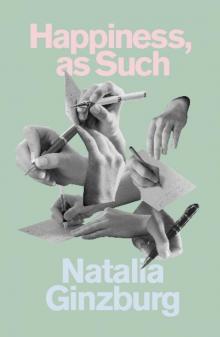 Happiness, as Such
Happiness, as Such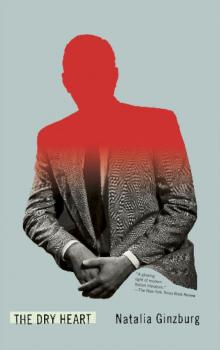 The Dry Heart
The Dry Heart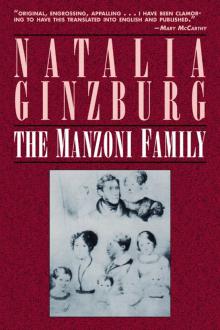 The Manzoni Family
The Manzoni Family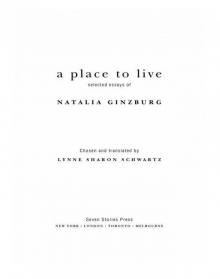 A Place to Live
A Place to Live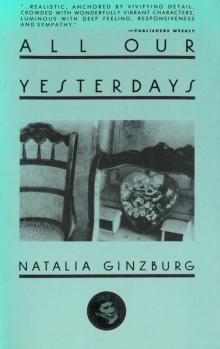 All Our Yesterdays
All Our Yesterdays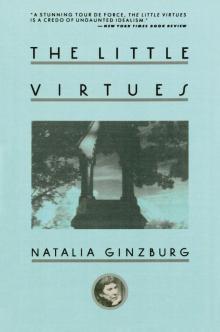 The Little Virtues
The Little Virtues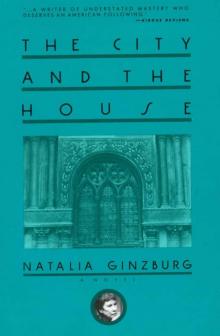 The City and the House
The City and the House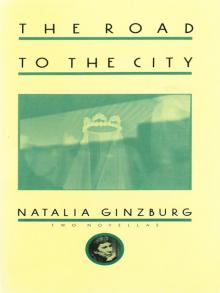 The Road To The City
The Road To The City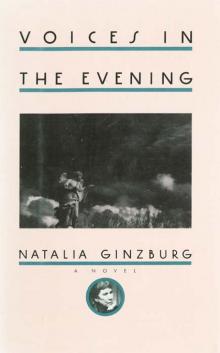 Voices In The Evening
Voices In The Evening